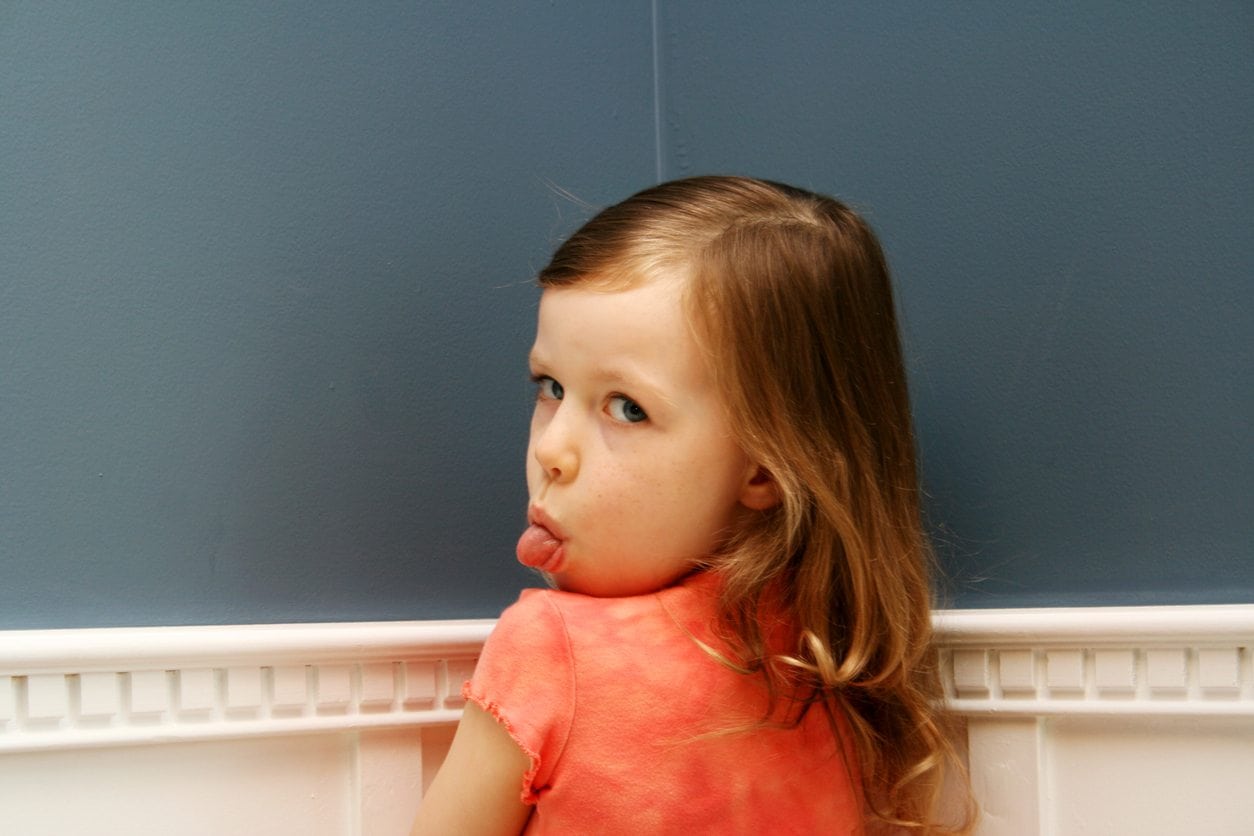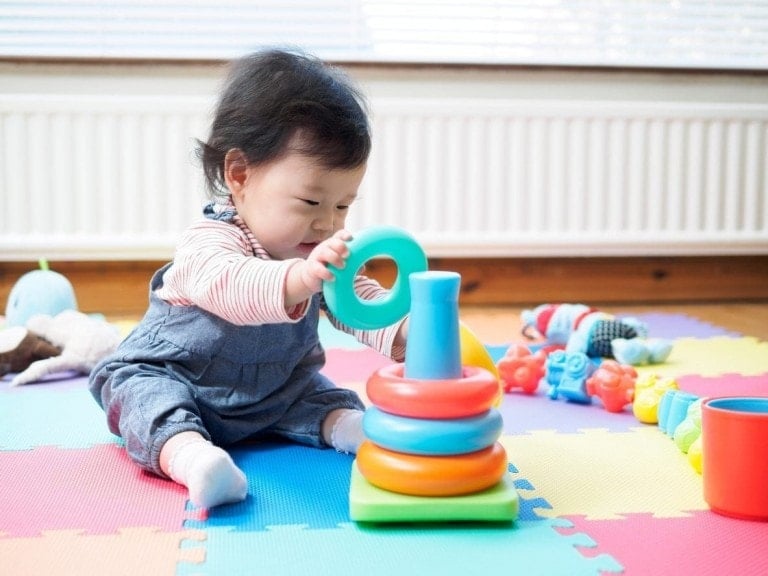I’m going to be honest here. I can’t tell you how many times I’ve been at the playground with my kids and observed interactions between other children and thought, “Wow. That kid is going to be an a**hole someday.” Of course, I would never say that out loud to anyone (well, maybe my sister because I know she won’t judge me). But I certainly think it — much more than I care to admit. (Seriously, please tell me I’m not the only one!)
After doing this, I wondered if other people might think that about my kids. God, I hope not! But I can’t deny my kids aren’t perfect. When it comes to raising kids, the early years are critical because they set the “tone” for a child’s behavior, values, and attitudes later in life. And studies show that disrespectful children grow up to become rude adults.1 It’s essential that we don’t create excuses and instead tackle rudeness and disrespect head-on. Our children need skills for navigating social situations and conflict, as well as positive communication strategies to help them develop healthy and adaptive relationships . . . and not turn into a$$holes!
How To Raise a Child Who Is Not an A$$hole
There are many key strategies to raise a child to become a well-adjusted, polite, and compassionate person. While I have included specific strategies, it’s also important to understand general things that can help them develop into good human beings. This includes clear boundaries; if you say no or set a boundary, keep it.2 Letting them get away with pushing boundaries is a surefire way to let our kids push limits and not take “no” for an answer. Make sure that if you set limits or consequences, you follow through.
Another critical thing to remember is modeling — monkey see, monkey do. Your children will see the way you handle situations and how you treat people.3,4 So, ensure you demonstrate the kinds of behaviors you expect of them. Some other practical tips to ensure you are not raising your child to be an a$$hole include:
1. Practice “Please” and “Thank You”
We all should have learned this fundamental concept from a young age. Unfortunately, I hear fewer of these simple words from kids’ mouths. Teaching our kids to say “please” and “thank you” is an effortless way to encourage polite, respectful behavior.5 And don’t forget, kids learn the most by observing YOU.12 Start practicing saying “please” and “thank you,” even to people you see every day and take for granted (hello, husbands!). This can lead your kids to mimic that behavior.13
2. Instill Good Manners From the Start
Again, good manners seem to have gone the way of the dodo. But you’re raising a child, it’s essential to instill good manners in them at a young age. The simple act of teaching your child to say “excuse me” or “yes, ma’am” or “yes, sir” goes a long way. Your child will learn how to show respect and consideration for someone other than themselves.6
3. Don’t Give Them Everything They Want
Listen, I struggle with this one. One of my love languages is giving gifts. I buy my kids all kinds of things because I love them and always think about making them happy. Despite my loving intentions, giving my kids everything they want will do nothing but turn them into selfish, entitled jerks. That’s the last thing I want for them. Instead, I need to show restraint and show them they can’t have everything. This will help them learn the lessons of delayed gratification, gratefulness, hard work, and gratitude.7
4. Start Chores Young
Giving your child chores from an early age teaches them about responsibility, natural consequences (when they don’t do them), and the satisfaction of rewards for hard work. These are all critical lessons to learn from doing chores early on.8 If you don’t raise a child to do chores and they are suddenly thrust into the real world (where people must be responsible and earn a living), they will be very unprepared.
5. Keep Rewards Reasonable
Don’t start giving your child $20 each time they complete the two items on their chore list. Don’t buy them a new iPad after cleaning their room for the first time in six weeks. Be reasonable about the rewards you give them; an award can be a simple “Well done, son!” and not money or things! If children get used to rewards for prosocial behavior (or behaviors you want them to repeat), they aren’t learning the real reason behind why these behaviors are necessary. Instead, they learn that they will get a reward for doing it.9
6. Start Community Service Young
Serving and volunteering in the community from a young age is a great way to teach your kids the art of giving back and helping others. For example, at Christmas, you can take your kids to the local soup kitchen or involve them in stuffing stockings for less fortunate children. You can include your children in many acts of kindness for helping or giving back to their community. For our children to develop empathy, which means they consider and understand the needs of others, they need to expand their circle of concern. When you’re raising your child, it’s crucial for them to learn about other ways of life and to consider and understand how other people feel.10
7. Point Out the Needs of Others
Another way of expanding their circle of concern is helping them understand other needs in social settings or their community. We drove to our local nature center the other weekend and stopped at a light near an overpass. We saw a homeless man on the corner with a sign asking for food or money. I never carry cash, and I would instead give food or something tangible they could use, and the only thing I had was an unopened bottle of water. So, I rolled down the window, gave the man my water, said, “God bless you,” and the light turned green.
As we were driving away, my daughter asked great questions about the encounter, and I taught her that many people in this world don’t have homes, enough food, or even clean water to drink. It was an eye-opening moment for her, and I know it will help her see the need around her.
8. Teach Them About Life in Other Countries
Along the same lines as the story above, teaching our children about the lives and struggles of people in other countries — especially children, because that’s who they can relate to the most — can help strengthen your kid’s ability to sympathize and think outside of their little bubble.10 Not everything is sunshine and roses for many people. I believe it is essential for children to learn how blessed they are and think about sharing those blessings with less fortunate kids.
9. Write Thank-You Notes
I may be the only mom still writing old-fashioned thank-you notes, but I don’t care. They are important! Taking the time to sit down and write a thank-you note for a gift or a kind deed that you received teaches valuable lessons on thankfulness and being grateful for gifts they’ve received, not to mention it has a far more significant impact on the recipient of the note.6 My kids are still too young to write on their own. So, we will sit down together, and I will have my kiddo dictate their thank-you to me, and I will write it for them. Then, I’ll have them “sign” the card and “decorate” it. They love doing this because it makes them feel good to know they’ve made someone smile by sending a thoughtful note!
I’m sure there are many more ways to raise a child using critical character-building lessons to keep them from becoming a**holes later in life. But these are the ones I’m starting with! Hopefully, if I do my job right, my kids will be decent human beings. And I won’t have to worry about other parents judging them on the playground (or anywhere else) someday.










